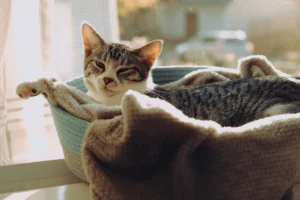Cats are unique creatures with specific dietary needs, and one vital nutrient often underestimated is vitamin A. Just like humans require essential vitamins for overall health, cats need adequate amounts of vitamin A to thrive and maintain their unique feline qualities.
Vitamin A is crucial for cats because it supports vision, immune function, and overall cell health. Unlike humans, felines cannot convert beta-carotene from plant sources into vitamin A, making it essential for their diets to include animal-based sources rich in this vital nutrient.
What roles does vitamin A play in a cat’s health?
Vitamin A is a powerhouse when it comes to maintaining your cat’s overall health. First and foremost, it’s crucial for vision. Vitamin A supports the retina, helping your furry friend see well, especially in low light. Without enough of it, your cat might struggle with night blindness or other visual impairments.
It also plays a significant role in keeping your cat’s skin and coat healthy. A deficiency can lead to dry skin, excessive shedding, and a dull, lifeless coat. Just like us, cats benefit from healthy skin, which protects them from infections and diseases.
Another vital area where vitamin A shines is in boosting the immune system. It helps maintain the integrity of mucous membranes, which are your cat’s first line of defense against pathogens. An adequate supply helps prevent infections and keeps your kitty active and vibrant.
For an added bonus, vitamin A is essential for cellular growth and reproduction. It aids in the proper functioning of various organs, ensuring that everything is running smoothly. Simply put, making sure your cat gets enough vitamin A is key to keeping them not just surviving, but thriving.
How do cats obtain vitamin A?
Cats have a unique requirement when it comes to getting their vitamin A. Unlike some animals that can convert plant-based carotenoids into vitamin A, felines need direct sources from their diet. The best way for cats to obtain this essential nutrient is through animal-based foods.
Here’s a quick rundown of top sources of vitamin A for your cat:
– Liver: Beef or chicken liver is one of the richest sources. Just a small amount can boost their vitamin A levels significantly.
– Fish: Certain fish like salmon and sardines provide beneficial omega-3s along with vitamin A.
– Eggs: These are another fantastic option. Cooked eggs are not only tasty but also nutrient-dense.
– Dairy: If your cat tolerates it, moderate amounts of dairy can offer vitamin A too.
While commercial cat food is typically fortified to meet vitamin A needs, it’s good to check the labels and select high-quality brands. Incorporating these foods in moderation can further enhance their overall nutrition. For more insights on feline nutrition, check out the Cornell University College of Veterinary Medicine to deepen your understanding of what keeps your cat happy and healthy.
What happens if cats lack vitamin A?
Lack of vitamin A can lead to some serious health issues in cats. Without it, they may suffer from vision problems, particularly night blindness, since vitamin A is crucial for maintaining good eyesight. The deficiency can also hamper the immune system, making your furry friend more susceptible to infections.
Additionally, skin issues often arise due to a weakened barrier function, leading to dryness, irritation, and potential hair loss. If the deficiency is severe, it can cause more systemic problems—think along the lines of reproductive issues and poorly functioning gastrointestinal systems. So, it’s pretty essential to keep your kitty’s vitamin A levels in check for overall well-being.
Are there signs of vitamin A deficiency in cats?
A cat’s health is intimately linked to its diet, and keeping an eye out for signs of vitamin A deficiency is vital. Here are some symptoms that might raise a red flag:
- Poor Night Vision: If your cat struggles to see in low light, it could indicate a lack of vitamin A.
- Dry Fur and Skin: Flaky, dry skin and a dull coat can signal that your cat’s not getting enough nourishment.
- Frequent Infections: An uptick in illness or skin infections might hint at a compromised immune system due to insufficient vitamin A.
- Lethargy: Your cat may seem less playful and more fatigued, which can stem from various nutritional issues, including vitamin deficiencies.
- Difficulty Breathing: In severe cases, difficulties with respiratory health might manifest, leading to wheezing or coughing.
The unique angle here is that while we often think about vitamins in the context of diet, individual cats may have different nutritional needs based on age, breed, or health conditions. Always consult your vet for a tailored diet plan or if you spot any of these signs. Keeping that line of communication with your vet can help catch potential issues before they escalate.
For more detailed information on feline nutrition, check out the American Association of Feline Practitioners.
How much vitamin A do cats need daily?
Cats have specific daily requirements for vitamin A that vary by their life stages and health conditions. Typically, an average adult cat needs about 1000 IU (international units) of vitamin A per kilogram of body weight per day. Kittens and pregnant or lactating queens may have higher needs, reaching about 1500 IU/kg daily.
It’s crucial to note that biologically active vitamin A (retinol) should come from animal sources, as cats can’t convert beta-carotene from plants efficiently. Many commercial cat foods are formulated to provide the right amounts of vitamin A, but if you’re considering a homemade diet, ensure you’re adding meals like liver, which is rich in this essential nutrient.
Feline health problems can arise from insufficient vitamin A intake, leading to issues like poor vision and skin disorders. Just like us, cats benefit from balanced nutrition tailored to their unique needs, so keeping track of their vitamin A is a must!
Can cats have too much vitamin A?
Hypervitaminosis A can happen when a cat ingests excessive amounts of vitamin A, often from over-supplementation or eating too much liver. This condition can lead to a variety of health issues, such as bone deformities, lethargy, and, in serious cases, organ damage.
Symptoms of vitamin A toxicity might include: – Anorexia: Loss of appetite can be a first sign. – Vomiting and diarrhea: Digestive distress commonly follows. – Bone abnormalities: Cats may experience pain or difficulty moving.
The threshold for toxicity varies, but prolonged exposure to excessive vitamin A—far above the body’s requirements—can be harmful. It’s important to consult your veterinarian before adding any supplements to your cat’s diet, especially if they’re already on a food formulated for their age or health status.
For a deeper understanding of feline nutrition, check out this resource from the American Association of Feed Control Officials (AAFCO): AAFCO Cat Food Nutrient Profiles.
Which foods are high in vitamin A for cats?
Cats are obligate carnivores, meaning they thrive on a meat-based diet. Vitamin A is crucial for their health, playing roles in vision, immune function, and skin health. Unlike some animals that can convert plant-based carotenoids into vitamin A, cats can only utilize it directly from animal sources.
Here are some of the best food sources rich in vitamin A for your feline friend:
Liver : Particularly beef or chicken liver, this organ meat is packed with vitamin A. Just a small amount can meet your cat’s daily needs.
Fish : Varieties like salmon and mackerel provide not only vitamin A but also beneficial omega-3 fatty acids.
Eggs : They’re not only a great source of protein but also contain vitamin A, especially in the yolk.
Dairy : While some cats are lactose intolerant, those that can tolerate dairy can receive vitamin A from cheese and yogurt.
Certain meats : Dark meats, such as those from heart or kidney, also contain this essential vitamin.
To ensure your cat’s diet is balanced, consider a high-quality commercial cat food that lists one of these ingredients prominently. Always consult with a vet to tailor your cat’s diet to their specific needs.
Trivia: Fun facts about vitamin A and cats
The discovery of vitamin A traces back to the early 20th century, when scientists were exploring the nutritional needs of animals. Interestingly, the term “vitamin” itself comes from the word “vital amine,” though it’s not technically an amine.
Felines have a unique relationship with vitamin A. Unlike dogs and humans, cats can’t synthesize this nutrient from beta-carotene, which is found in plants. This evolutionary quirk underscores their status as strict carnivores.
Moreover, vitamin A contributes to a cat’s sharp night vision, helping them see in low light—an essential trait for their hunting lifestyle.
A fun fact for cat enthusiasts: Not just beneficial internally, vitamin A also plays a role in maintaining a healthy coat, making it look shiny and vibrant!
For more detailed insight on feline nutrition, check out the American Association of Feed Control Officials (AAFCO) at aafco.org.
What are common myths about cats and vitamins?
Myths about cats and vitamins seem to spread faster than catnip at a feline party. One persistent misconception is that all cats can get sufficient vitamins from a meat-only diet. While it’s true that cats are obligate carnivores and thrive on animal protein, they need specific vitamins for overall health—vitamin A being a key player here. Unlike dogs or some other animals, cats can’t convert beta-carotene from plants into usable vitamin A. This means they rely on animal sources to get it directly.
Another myth is that commercial cat foods meet all nutritional needs, including vitamins. While many brands are formulated to provide balanced nutrition, not every kitty’s needs are the same. Factors like age, health conditions, and lifestyle can affect a cat’s specific vitamin requirements. Always check in with your vet for tailored advice.
Also, there’s talk that cats can get everything they need from the occasional fish or chicken treat. While these can be delicious snacks, they often lack the essential nutrients your cat needs for optimal health, including vitamin A.
Here’s a quick rundown of some common myths: – Cats don’t need vitamins: False; they require vital nutrients, including vitamin A. – Only meat provides sufficient nutrition: Not entirely true; they need a balanced diet with specific vitamins. – All commercial foods are equal: Quality varies, and not every food meets every cat’s needs. – Occasional treats are sufficient for nutrients: Inadequate; they should be part of a well-rounded diet.
Understanding these myths helps ensure your feline friend gets the right nutrients they need to thrive. For a deeper dive into feline nutrition, check out the comprehensive resource from the American Association of Feed Control Officials (AAFCO): AAFCO.
Alex, a passionate animal lover, has experience in training and understanding animal behavior. As a proud pet parent to two dogs and three cats, he founded AnimalReport.net to share insights from animal experts and expand his knowledge of the animal kingdom.





Is it ethical to use aversive training methods on dogs, even if they yield quick results? Consider the long-term psychological effects on the dog and the potential for damaging the human-animal bond. What alternatives could be more beneficial for both the dog and the owner?”,
“refusal
[url=https://www.yorkshire-terrier-zucht.de/]Yorkies[/url]